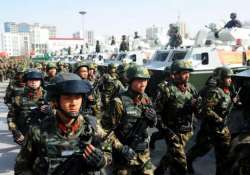China set to deploy 1 lakh marine corps at ports in Gwadar and Djibouti: Report
In a move aimed at exerting its influence abroad, China has planned to expand its marine corps extensively including at the strategic Gwadar port in Pakistan and military logistics base in Djibouti in the Indian Ocean.

In a move aimed at exerting its influence abroad, China has planned to expand its marine corps extensively including at the strategic Gwadar port in Pakistan and military logistics base in Djibouti in the Indian Ocean.
According to reports, the plan is to increase the number of marine corps personnel from 20,000 to 1 lakh. The move will be accompanied by cuts to the Chinese military's land forces in an attempt to modernize the People's Liberation Army.
Hong Kong based South China Morning Post on Monday reported that the expansion is planned to protect China’s maritime lifelines and its growing interests overseas.
Some members will be stationed at ports China operates in Djibouti and Gwadar in southwest Pakistan.
Gwadar port is a deep-sea port next to the Strait of Hormuz, the key oil route in and out of the Persian Gulf, built with Chinese funding and operated by mainland firms. Although the port is not home to any PLA installation, navy ships are expected to dock at the facility in the near future, the report said.
Gwadar also connects the China-Pakistan Economic Corridor (CPEC) through PoK with China’s Xinjiang.
Reports from Pakistan said that the country itself is setting up Special Security Division comprising 15,000 troops, including 9,000 Pakistan Army soldiers and 6,000 para-military forces personnel to protect CPEC and Chinese personnel.
The expanded Chinese marine corps is part of a wider push to refocus the world’s largest army away from winning a land war based on sheer numbers and towards meeting a range of security scenarios using highly specialised units, the Hong Kong based daily said.
Towards that end, Chinese President Xi Jinping is reducing the size of the People’s Liberation Army (PLA) by three lakh, with nearly all of the cuts coming from the land forces, it said.
For this, two brigades of special combat soldiers had already been moved to the marines, nearly doubling its size to 20,000, and more brigades would be added, the report said.
“The PLA marines will be increased to 100,000, consisting of six brigades in the coming future to fulfil new missions of our country,” it quoted a source as saying.
The size of the navy would also grow 15 per cent from its current estimated size of 2.35 lakh personnel.
China this year plans to increase its defence spending by about seven per cent to USD 152 billion. Much of it was expected to go to the navy as China plans to spread its influence far from its shores.
Traditionally, marines have mostly operated only in China’s coastal areas, as their role was limited by their relatively small numbers and basic equipment, Beijing-based naval expert Li Jie said.
But a bigger corps could be deployed much farther afield as the navy takes on more challenges.
“Besides its original missions of a possible war with Taiwan, maritime defence in the East and South China seas, it’s also foreseeable that the PLA Navy’s mission will expand overseas, including protection of China’s national security in the Korean peninsula, the country’s maritime lifelines, as well as offshore supply deports like in Djibouti and Gwadar port in Pakistan,” Li said.
Beijing has one aircraft carrier and is building one more with a third in the pipeline.
China is constructing a naval base in Djibouti to provide what it calls logistical support in one of the world’s busiest waterways in the Indian Ocean.
China denies it is an overseas military base but a logistics centre which will be used mostly for resupply purposes for anti-piracy, humanitarian and peacekeeping operations.
Liu Xiaojiang, a former navy political commissar, said the maritime force would take on an increasingly central role in the military.
“China is a maritime country and as we defend our maritime rights and develop our interests, the status of the navy will be more important,” Liu told reporters on the sidelines of China’s parliament session.
Macau-based military observer Antony Wong Dong said an expanded marine corps could help maintain security for China’s ‘One Belt One Road’ initiative.
The plan calls for new trade and investment links stretching from Southeast Asia to eastern Europe, and will likely see Chinese companies as well as their workers operating in high-risk areas such as Pakistan and Afghanistan.
The marines were established in the 1950s in the aftermath of the civil war between China’s Communists and Chiang Kai-shek’s Nationalists who fled to Taiwan.
For decades, Taiwan had the second-largest marine force in the world, after the United States, but its stature began to decline in the 1990s when Beijing began pursuing claims in the South China Sea.
